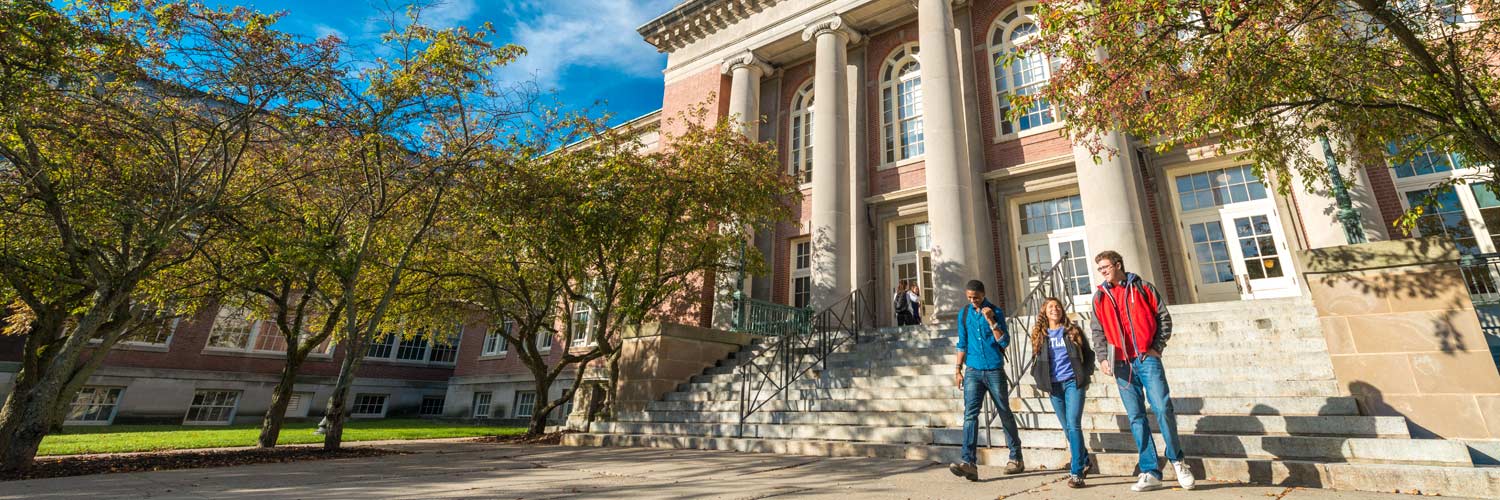Mike Guity understands that nothing great comes easy.
If it did, the senior would have changed his major from mathematics. He also might have stepped down as the president of SUNY Cortland’s Black Student Union (BSU) during his junior year in 2015, when racial tensions across the nation reached a boiling point.
“Quitting isn’t in my body,” says Mike, who grew up in Brooklyn.
No, instead Mike elected to stick with his major because he wants to be a certified public accountant. And rather than ignore the civil unrest in places like Ferguson, Mo., he helped organize two campus town hall meetings when SUNY Cortland students looked to BSU for a voice.
Mike still hangs on to the memory of standing on stage in a packed Old Main Brown Auditorium, where both open forums took place. In a crowded room, he was the smart and confident student leader that the campus needed.
“People cared,” he says, recalling the town hall events. “People were passionate about having a conversation so that we could set the example for campuses nationwide.”
No doubt, attending college in Central New York was different, even for Mike at first. Before he arrived in Cortland, he had never ventured outside of New York City besides a childhood trip to Honduras, where his parents were born.
“I saw all different kinds of people on campus,” he remembers. “I wouldn’t say that it was difficult, but it was different than what I was used to.”
As a freshman, Mike kept to himself and spent time mostly with his longtime girlfriend Esosa Aideyan, who came to SUNY Cortland to study psychology.
“I thought the biggest attraction was the Walmart,” he jokes. “It wasn’t until I got out of my dorm room that I realized there was a lot more to do.”
On a whim, Mike decided to run for treasurer of BSU at the end of his freshman year. He gradually became a fixture in SUNY Cortland’s Voice Office, home to nine multicultural student groups on campus, from the Caribbean Student Association to La Familia Latina to Women of Color.
Then, as president of BSU during his junior year, some students approached him with complaints about isolated bias-related incidents. Mike didn’t shrug them off. He worked with the College’s Multicultural Life and Diversity Office on the town hall meetings — one in the fall and another in the spring.
But even he didn’t expect the outpouring of interest those events received.
Students shared their stories, both good and bad, for several hours. Professors and staff members joined them. Campus leaders listened and acted.
“Our school is headed by, in my opinion, the best college president in the nation,” Mike says, referring to SUNY Cortland President Erik J. Bitterbaum. “He’s so dedicated and so supportive of everything that BSU does.
“That attitude trickles down.”
Mike saw the payoff of the town hall events in the days and weeks that followed them. He witnessed it in the interactions of campus community members — between students, faculty and staff members who may have once been complete strangers to each other.
“I think I’m most proud of the doors that have been open … not just for me, but for all students who felt like their opinions didn’t matter,” Mike says. “So many students have developed a relationship with faculty and staff that they might not have had before.
“It’s not always easy, but sometimes all you need is that push.”
